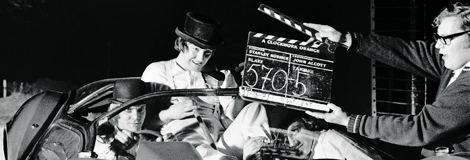A Clockwork Orange Revisited
There’s a man strapped down to his chair in the in the room in which I’m watching a film. He’s wearing a straightjacket and sat about four rows in front of me, the light from the screen illuminates his mouth, which is fixed in a contorted grimace, while he writhes in convolutions of pain. Eye clamps prevent him from looking away.
Watching one of cinema’s most iconic scenes in exactly the same spot where Alex, played by Malcolm McDowell, receives his notorious aversion therapy in Stanley Kubrick’s A Clockwork Orange has a surreal, Alice in Wonderland-like effect. There’s a sensation at one point that I might fall into the screen and receive a tap on the shoulder from one of the doctors administering his treatment.
We’re in a lecture theatre at Brunel University watching Stanley Kubrick’s masterpiece as part of Volkswagen’s See Film Differently promotion, where classic films are screened in the location they were shot.
As part of this evening’s line-up there’s a fantastic Moloko-themed milk bar to drink in, similar to the one Alex and his droogs frequent; a fascinating one-off exhibition of original stills and film memorabilia; and a string quartet dressed in bowler hats and playing our antihero’s favourite: Ludwig Van’s Ninth.
And if that wasn’t enough to make fans giddy, Kubrick’s brother-in-law and producer Jan Harlan is on hand to answer our questions about the auteur’s infamous film, which was pulled from cinemas in the UK soon after it was thought to have inspired a string of violent crimes.
‘Clockwork Orange is a political film and prophetic in many ways. The end of the film is not about the hoodlum, but the way power deals with him,’ says Harlan. ‘Watching it you can see how Kubrick struggled [with every detail]. And to be satisfied with his work was his biggest struggle.’
In his lifetime Anthony Burgess came to fear his novel would simply be remembered as ‘the fountain and origin of a great film’. While both book and film stand as great pieces of art in their own right, Kubrick’s work has a slightly different feel – most notably because he chose to miss out the last chapter, which suggests Alex will grow out of his predilection for violence.
Kubrick’s A Clockwork Orange celebrates its 40th anniversary this year and watching it again reminds me of the full range of thoughts and feelings it provokes. Horror at the brutality of its violence; the uncanny feeling of its dystopian vision; philosophical questions of where goodness comes from; its blood-pumping classical music soundtrack; and of course, the sheer viewing pleasure of seeing images that feel as fresh and strange as they did the first time I saw this film.
You don’t really enjoy A Clockwork Orange so much as experience it. ‘A great film is one that doesn’t disappear,’ says Harlan. And this one’s lasting popularity certainly stands as testament to that.
A Clockwork Orange was shown on June 2 as part of Volkswagen’s See Film Differently. For information about future screenings, visit their website.







Clockwork Orange is not an easy motion picture to absorb or digest. Oddly, the sex and violence are easier to take than the razor-sharp edge of Kubrick’s satire and the corresponding awareness of its pinpoint accuracy when addressing the issue of the dehumanization of people. As I write this in 2012, the extremities of A Clockwork Orange have not come to pass, but society is slowly moving down the slippery slope that the movie cautions against. I have the disturbing feeling that if the solution to crime proposed by the film (brainwashing) was medically and economically feasible, the government would leap onto the bandwagon. When one character speaks of our willingness to “sell liberty for a quieter life,” it strikes an ominously familiar chord. Under its current mayor, New York City has yielded numerous freedoms in return for a reduction in the crime rate. And in Russia, the famished citizens would give up all their newly acquired rights for the promise of full bellies.